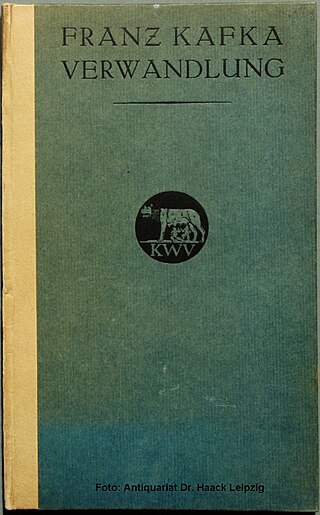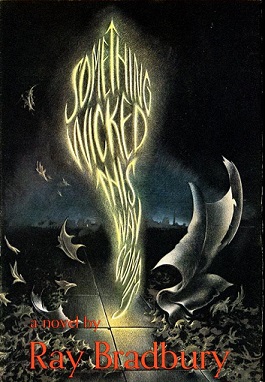Plot summary
The story concerns Charles, a thirteen-year-old boy who is suffering from a severe illness. The local doctor diagnoses it as scarlet fever, but Charles protests that his hand has "changed" and is no longer under his control. He claims that he has been infected by microbes that are not only causing illness, but literally taking over his body and forming a new being. The doctor, however, assures Charles's parents that this is all in his imagination—a fever dream brought on by his illness.
Charles continues to lose control of his body—first his other hand, then his legs—but the doctor continues to assure him otherwise, and gives him antibiotics to deal with his problems. After Charles tries to choke himself, he is restrained to the bed by his parents. One night, Charles begins to lose control of his body, and he feels himself being taken over by the microbes.
The next morning, Charles appears fully recovered. He is pronounced completely healthy by the astonished doctor, whose hand Charles vigorously shakes. After the doctor leaves, however, Charles brushes his foot over a swarm of red ants on the floorboard in the carriage, killing them on contact. It appears that he has, indeed, been taken over by the microbes in his body.

The Metamorphosis, also translated as The Transformation, is a novella by Franz Kafka published in 1915. One of Kafka's best-known works, The Metamorphosis tells the story of salesman Gregor Samsa, who wakes one morning to find himself inexplicably transformed into a huge insect and struggles to adjust to this condition. The novella has been widely discussed among literary critics, who have offered varied interpretations. In popular culture and adaptations of the novella, the insect is commonly depicted as a cockroach.

Ray Douglas Bradbury was an American author and screenwriter. One of the most celebrated 20th-century American writers, he worked in a variety of genres, including fantasy, science fiction, horror, mystery, and realistic fiction.

The Shining is a 1977 horror novel by American author Stephen King. It is King's third published novel and first hardcover bestseller; its success firmly established King as a preeminent author in the horror genre. The setting and characters are influenced by King's personal experiences, including both his visit to The Stanley Hotel in 1974 and his struggle with alcoholism. The novel was adapted into a 1980 film and a 1997 miniseries. The book was followed by a sequel, Doctor Sleep, published in 2013, which in turn was adapted into a film of the same name in 2019.

The Illustrated Man is a 1951 collection of 18 science fiction short stories by American writer Ray Bradbury. A recurring theme throughout the stories is the conflict of the cold mechanics of technology and the psychology of people. It was nominated for the International Fantasy Award in 1952.

The Story of Louis Pasteur is a 1936 American black-and-white biographical film from Warner Bros., produced by Henry Blanke, directed by William Dieterle, that stars Paul Muni as the renowned scientist who developed major advances in microbiology, which revolutionized agriculture and medicine. The film's screenplay—which tells a highly fictionalized version of Pasteur’s life—was written by Pierre Collings and Sheridan Gibney, and Edward Chodorov (uncredited).

Franklin Benjamin Richards is a fictional character appearing in American comic books published by Marvel Comics. The character is usually depicted as a supporting character in Fantastic Four. He has been portrayed as a child and as a novice superhero.
Castration anxiety is an overwhelming fear of damage to, or loss of, the penis—a derivative of Sigmund Freud's theory of the castration complex, one of his earliest psychoanalytic theories. The term refers to the fear of emasculation in both a literal and metaphorical sense.

Lilith: A Romance is a fantasy novel by Scottish writer George MacDonald, first published in 1895. It was reprinted in paperback by Ballantine Books as the fifth volume of the Ballantine Adult Fantasy series in September 1969.

Postpartum infections, also known as childbed fever and puerperal fever, are any bacterial infections of the female reproductive tract following childbirth or miscarriage. Signs and symptoms usually include a fever greater than 38.0 °C (100.4 °F), chills, lower abdominal pain, and possibly bad-smelling vaginal discharge. It usually occurs after the first 24 hours and within the first ten days following delivery.

Something Wicked This Way Comes is a 1962 dark fantasy novel by Ray Bradbury, and the second book in his Green Town Trilogy. It is about two 13-year-old best friends, Jim Nightshade and William Halloway, and their nightmarish experience with a traveling carnival that comes to their Midwestern home, Green Town, Illinois, on October 24. In dealing with the creepy figures of this carnival, the boys learn how to combat fear. The carnival's leader is the mysterious "Mr. Dark", who seemingly wields the power to grant the townspeople's secret desires. In reality, Dark is a malevolent being who, like the carnival, lives off the life force of those it enslaves. Mr. Dark's presence is countered by that of Will's father, Charles Halloway, the janitor of the town library, who harbors his own secret fear of growing older because he feels he is too old to be Will's dad.

For much of his adult life, Charles Darwin's health was repeatedly compromised by an uncommon combination of symptoms, leaving him severely debilitated for long periods of time. However, Darwin himself suggested that, in some ways, this may have helped his work: "Even ill-health, though it has annihilated several years of my life, has saved me from the distractions of society and amusement."
Biblical literalism or biblicism is a term used differently by different authors concerning biblical interpretation. It can equate to the dictionary definition of literalism: "adherence to the exact letter or the literal sense", where literal means "in accordance with, involving, or being the primary or strict meaning of the word or words; not figurative or metaphorical".

The Red Pony is an episodic novella written by American writer John Steinbeck in 1933. The first three chapters were published in magazines from 1933 to 1936. The full book was published in 1937 by Covici Friede. The stories in the book are tales of a boy named Jody Tiflin. The book has four stories about Jody and his life on his father's California ranch. Other main characters include Carl Tiflin – Jody's father; Billy Buck – an expert in horses and a working hand on the ranch; Mrs. Tiflin – Jody's mother; Jody's grandfather – Mrs. Tiflin's father, who has a history of crossing the Oregon Trail, and enjoys telling stories about his experiences; and Gitano – an old man who wishes to die at the Tiflin ranch. Along with these stories, there is a short story at the end of the book titled "Junius Maltby". However, this last story is omitted in the edition published by Penguin Books.

Allegorical interpretations of Genesis are readings of the biblical Book of Genesis that treat elements of the narrative as symbols or types, rather than viewing them literally as recording historical events. Either way, Judaism and most sects of Christianity treat Genesis as canonical scripture, and believers generally regard it as having spiritual significance.
Vis medicatrix naturae is the Latin rendering of the Greek Νόσων φύσεις ἰητροί, a phrase attributed to Hippocrates. While the phrase is not actually attested in his corpus, it nevertheless sums up one of the guiding principles of Hippocratic medicine, which is that organisms left alone can often heal themselves.
Reflex asystolic syncope (RAS) is a form of syncope encountered mainly, but not exclusively, in young children. Reflex anoxic seizures are not epileptic seizures or epilepsy. This is usually a consequence of a reduction in cerebral perfusion by oxygenated blood. It can be a result of either a sudden reduction in the blood flow to the brain, a drop in the oxygen content of the blood supplying the brain, or a combination of the two. Syncope can have different meanings ranging from transient loss of consciousness, usually accompanied by a decrease or loss in postural tone, to tonic and myoclonic events and nonepileptic spasms.
The wild fox kōan, also known as "Pai-chang's fox" and "Hyakujō and a Fox", is an influential kōan story in the Zen tradition dating back as early as 1036, when it appeared in the Chinese biographical history T'ien-sheng kuang-teng lu. It was also in The Gateless Gate, a 13th-century collection of 48 kōans compiled by the Chinese monk Wumen, as case two.

The Best Little Girl in the World is a 1981 television film directed by Sam O'Steen and executive produced by Aaron Spelling. The film is based upon the 1979 novel of the same name written by Steven Levenkron.

Charles Lambert McPhee was a researcher, author, and nationally syndicated talk radio host. On his call-in program, "The Dream Doctor Show", which began in 2000, he interpreted dreams for people. He was a nephew of best-selling author John McPhee.
Hector Hall is a superhero appearing in American comic books published by DC Comics. Created by Roy Thomas and Jerry Ordway, he made his first appearance in All-Star Squadron #25. Throughout the character's history, he has adopted several superhero codenames although he is frequently associated with Hawkman, Hawkgirl, Hawkwoman, often depicted as the child of Hawkman and of either women depending on the version.














